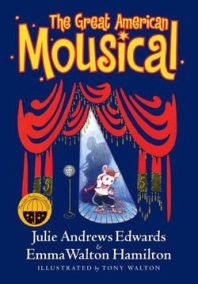Miss Addie’s Advice for Theatre Mice
 Whenever anyone asks what advice I have for a young person who is thinking about becoming an actor, I say the same thing:
Whenever anyone asks what advice I have for a young person who is thinking about becoming an actor, I say the same thing:
Be ready! Opportunities can come up out of the blue – and they will – but what makes the difference is being ready to meet the opportunity when it arises. There are many things you can and should do to prepare yourself if you’re serious about pursuing a life in the theater. Here are a few of the most important:
- Take acting classes – Regardless of whether you are interested in musical theatre or drama, you must take acting lessons. Knowing how to portray a character truthfully and believably is the key to a successful performance, no matter what the style of the show. There are many different techniques of acting training out there. Familiarize yourself with the differences and find the one that speaks to you. Make sure, though, that you are studying stage craft and not just film acting – an actor who has trained for the stage can easily make the leap to film, but not necessarily the other way around! Look for both acting technique and scene study classes.
- Study voice – Singing lessons are essential if you want to perform in musicals, but even for straight plays you should study vocal placement and diction. This is very important in terms of being able to be heard by the last row of a theatre and also can help clear up regionalisms, accents, and speech affectations which will make you more versatile.
- Take dance or movement classes – As a performer, your body is your instrument and you must keep it in shape. Eat well, get plenty of rest and pursue as many forms of physical training as you can. Some of the most valuable techniques for an actor are modern dance, ballet, tap, yoga, tai chi or other marshall arts, fencing and stage combat.
- Read plays, see shows, listen to cast albums – Go the theater as much as possible! Immerse yourself in the culture of the performing arts and learn as much about it as you possibly can. Know the different composers, lyricists, directors, actors, designers, playwrights. Become savvy about the business – its history, current events, trends, styles. If you can’t get to a Broadway show, find local community theatres or school performances you can attend. Offer to usher or volunteer at a theater in exchange for a ticket to see a show.
- Read trade papers and magazines and visit websites – There are many good papers, magazines and websites that report on theatre news. Some of the best are: The New York Times, Backstage, Variety, American Theatre, Playbill, playbill.com, theatremania.com, generationbroadway.com, broadway.com
- Audition for everything you can – Even if you don’t think you’re right for the part, try out for school productions, local community theatre productions and attend general auditions and open calls for theaters whenever you can. Having plenty of experience of auditioning and performing in front of people is invaluable preparation for the big chance!
- Offer to be a ‘reader’ at casting sessions – Many theatres, both professional and community, as well as casting offices, hold auditions on a regular basis and need volunteers to read opposite the people auditioning. This is a great way to learn what works and what doesn’t work in an audition situation, and you might make some good contacts in the process!
- Volunteer, intern or apprentice at a theater – Even if all you want to do is perform, you will be the better team player if you have a good understanding of all the different things it takes to put on a show. Most theatres rely on volunteers and young theatre students to get everything done. You can sign up to be an usher in exchange for free tickets to a show – or better still, volunteer to assist backstage or ‘front of house’. You can also apprentice or intern at many theatres, and work in a particular department like costumes, lighting or stage management. Being an assistant stage manager is invaluable experience for an aspiring actor!
So hone every skill you can…you never know when you might get ‘that call’!
STAGE FRIGHT
Even the most experienced performers feel nervous or insecure as opening night approaches. It’s very normal… it takes a lot of courage to get up in front of an audience and give of yourself and be willing to fail. There are techniques that can help a little, though:
- Adrenalin kicks in with nerves and excitement, and can leave one feeling shaky. I find that being sure to have a small meal that includes lots of protein (cheese is great!) at a sensible hour before the show helps me deal with the physical shakes.
- Try to sort out what is really nerves and what is simply anticipation and excitement about the joy of offering something to the audience that is hopefully going to give them a good time.
- Single out some faces in the crowd that appear friendly, someone either side of the auditorium and someone in the middle, perhaps, and do the show for them.
- What character are you playing? Prepare early, ahead of curtain time, so that you are ‘wearing the role’ as you walk onstage.
- Above all, try not to watch your own performance as you proceed. Think as your character would think, do as your character would do, and stay in the ‘giving ‘mode… send your character out across the footlights.
- Finally, try to pretend that this is a lovely party – ‘your’ party – and that everyone has come to visit you, at your home. Feel the joy!
THEATER ETIQUETTE
Going to see a professionally produced play or musical is a special experience.
If, as a theater-goer, you keep in mind courtesy for the performers as well as your fellow audience members, everyone’s experience will be optimized.
The following are a few important reminders for attending the theater:
1. Please Be Quiet During The Performance. Please do not talk, whisper, repeat the dialogue, comment on what is happening or explain the plot to your friends. Unlike film or television, these are live actors whose performance is impacted by the reaction from the audience, and the other audience members around you deserve to have the quality experience they have paid for. Of course, applause for the actors after musical numbers and at the end of the show is expected and appreciated!
2. Please Be Still During The Performance (And Remove Your Hat If You Are Wearing One.) Fidgeting is intrusive and distracting to those around you. Please strive to sit quietly and give the actors your full attention.
3. Please Leave Your Camera, iPod Or Other Electronic Device At Home. Copyright laws prohibit photographing or recording a performance, so your camera or other recording device could be illegal as well as bothersome to those around you, and may even be confiscated by the management. Any other kind of electronic device – iPods, GameBoys, etc. – have no place in the theater and are disrespectful of the performers and the other audience members around you.
4. Please Turn Off All Cell Phones, Pagers Etc. Beepers, pagers, alarm watches, cell phones, and other noisy electronic devices must be turned off, or better still, left at home. If you do bring them in to the theater, it is especially important to remember to turn them off again after intermission. And please, NO TEXT MESSAGING during the performance! This is extremely discourteous to the performers and distracting to those around you.
5. Please Do Not Eat Or Drink In The Theatre. Unlike a movie, which keeps going no matter what noise you make, the actors on stage are distracted by what they hear in the auditorium. You will contribute to an enjoyable experience for everyone if you refrain from rattling wrappers or opening lozenges during the performance. If you must have a lozenge to stave off a cough, for example, plse try to unwrap it during a musical number or applause. Generally speaking, food and drinks are not allowed in professional theaters.
6. Please Do Not Put Anything On The Stage. Bags, playbills etc. may not be placed on the stage. These items are distracting for the audience to look at and dangerous for the actors.
7. Please Keep Your Playbill / Program Quietly In Your Lap Or On The Floor. Please do not riffle or rattle your playbill/program, roll and unroll it, or otherwise fiddle with it. Also, it is considered impolite to read your program during the performance. Read it before and after the show or during intermission.
8. Please Keep Your Feet Off The Seats, Stage, Balcony Railing And Out Of The Aisles. Please sit in a theater the same way you might in a church or important class. Do not drape your legs over the seat or railing in front of you and do not walk on another seat to get in or out of yours. If you are in an aisle seat, please keep your feet out of the aisles. It is very dangerous to block the aisles and it is also against the fire code. Most of all, if you are in the front row, never put your feet on the stage.
9. Please Remain In Your Seat Until The End. The end of the show means the end of the curtain call or bows. Please do your best to use the restrooms only during intermission. If you must leave the theater during the performance, please try to do so at an unobtrusive moment – during applause, for example – and be aware that you may not be permitted back in until an appropriate interval. It is extremely discourteous to the actors to head for the door before the performance is entirely ended.
10. Any Negative Comments That You May Have About The Performance Should Be Kept To Yourself Until You Leave The Theater.
Reprinted from “The Great American Mousical” (Harper Collins)


